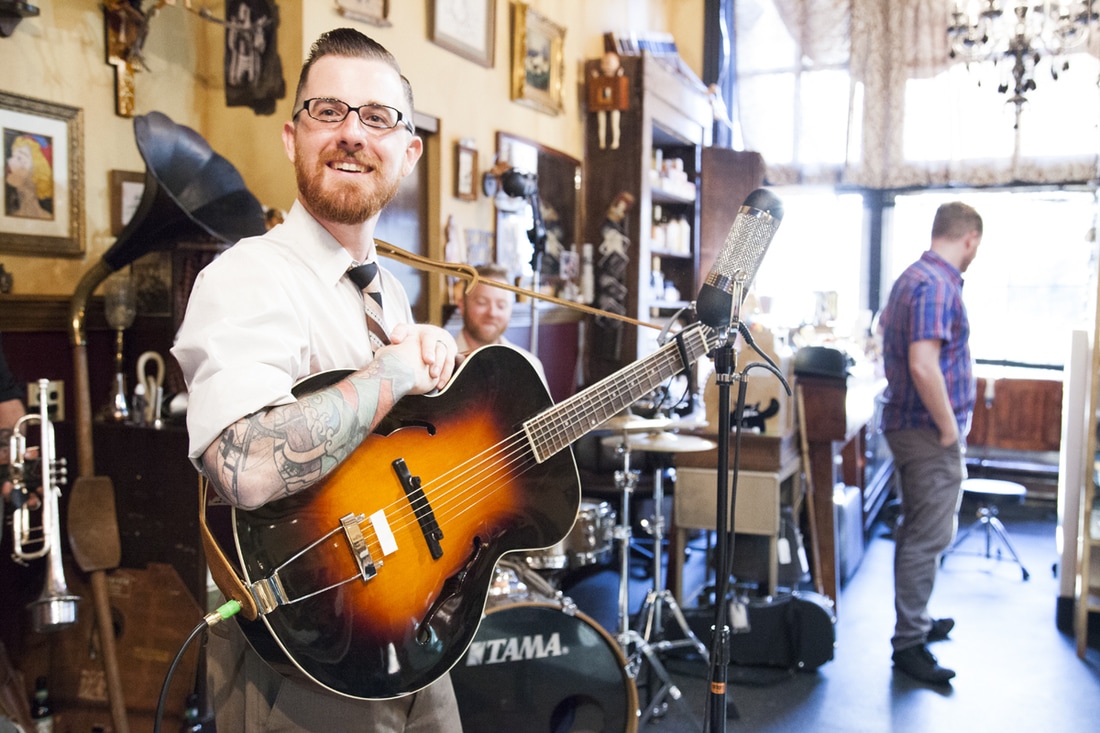|
Caleb & The Gents' music incorporates all the hallmarks of a good jugband; banjo, kazoos, archtop guitar, washboard bass lines, and rowdy group choruses. With its tin-pan two step backbeat, “All That Money” spins a tale any musician can relate to; there’s a whole lot of money in the world, and none of it is yours. The Gents weave an intricate and controlled palette that allows each member to shine through the mix like silver dollars. And that’s the heart of what’s remarkable about this song: it is meticulously orchestrated and extremely streamlined. You can buy a copy of The River EP here. SC: How do you see the 1920s rhythms and textures of western swing relating to contemporary life? CW: Plenty of ways! It all depends on how you look at it or listen to it. I feel like a lot of times, the instrumentation maybe isn't always more simple than other styles of music, but it's very centered around feeling the song out and playing what the piece calls for. The rhythm is also very, very consistent. Like a heartbeat, or the sound of a train coming down some old railroad tracks, or the rhythm of a hammer driving a nail into a piece of lumber. SC: I love the vivid details and bitter irony in this song. For example in the second verse “It’s the same thing every day / I’m working hard just like i should / boss man wrote me a check / said you take that to the bank / you know that check ain’t no good,” I’m wondering if you could share some of the inspiration behind that verse.
stretch and the boss telling me that he didn't know if he could pay me for the work. I wrote that line the next morning, drinking my coffee before work.
SC: What was your writing process like for "All That Money"? CW: It was a slow-going process that I drug out over quite a few months, but when it clicked, the song just came together and was complete in the matter of three or four days. I wrote (a rough version) of the chorus while I was driving one day, with no music. Just an idea that I thought it would be sort of humorous to write about how broke I was at the time. It didn't come from a sad place. I didn't have a "woe-is-me" approach to it. I just thought that everybody, at some point, had been where I was at that moment, if not in a worse way, and so it seemed like everyone could relate to laughing about how little money they had. Then, I went through months of not really adding anything to that chorus until I stumbled into the chord progression one night. After that, the verses and the final version of the chorus just spilled out over the course of a few days. SC: Tell me about your normal writing process. Do you keep a songwriting schedule? Or do you wait for inspiration? CW: I don't necessarily have a process, although I probably should. I play my guitar or my banjo every day and I practice new styles of playing, new chord voicings, new scales, and things like that. I'm always looking for the next chord progression that is going to make me feel like it needs to be a song. I write all the time, but not always music. I write in the car, in the shower, at work, when I'm watching a movie, I get up in the middle of the night to write things down. I write songs, thoughts that might turn into songs later, short stories, or might sit down and describe in the most vivid detail I can, a scene that I can recall in my head. All that to say, I think it's damn near impossible for me to not be creating something. More often than not, I feel like I'm wasting time if I'm not being at least somewhat creative. SC: How does your community of songwriters influence your work? CW: All the folks I'm lucky enough to be musically involved with are incredibly talented and I think more than anything, it makes me want to continually improve. Not that I'm unsatisfied with the music I write, or the lyrics in the songs, but I don't think there will ever be a point where I say, "Well, that's it. That's the best I can do," and I owe that largely to that group of folks who are continually pushing me to do better. As a community, if we all keep working harder to make better and better music, and to grow our craft and our trade, then that is going to make this community stronger as a whole.
0 Comments
Leave a Reply. |
The Sound Connector is an online magazine for songwriters. We feature songwriting challenges, monthly interviews, and the opportunity to discover new songwriters. We are interested in all things related to the craft of songwriting. Do you want to be featured on The Sound Connector? Send us your songs!
Categories |

 RSS Feed
RSS Feed